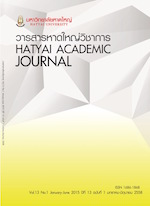ความรู้ความสามารถของครอบครัวในการดูแลผู้สูงอายุหลังผ่าตัดต้อกระจก
Main Article Content
Abstract
ผลการวิจัย พบว่า ผู้ดูแลผู้สูงอายุหลังผ่าตัดต้อกระจก ณ หอผู้ป่วยตา โรงพยาบาลสงขลานครินทร์ มี ความรู้ ในการดูแลผู้สูงอายุหลังผ่าตัดต้อกระจก อย่างถูกต้อง ร้อยละ 97.14 ซึ่งเข้าใจว่า มองเห็นภาพบิดเบี้ยวหรือ เหมือนมีอะไรบางอย่างลอยไปมาในตา เป็นอาการปกติสามารถรอพบแพทย์ให้ถึงวันนัดได้ ร้อยละ 12.90 รองลง มา เข้าใจว่า หากไม่มีอาการผิดปกติ ไม่จำเป็นต้องมาพบแพทย์ทุกครั้งที่แพทย์นัด ร้อยละ 9.68 และมีความสามารถ ในการดูแลผู้สูงอายุหลังผ่าตัดต้อกระจกอยู่ในระดับดีมาก ร้อยละ 76.88 ดังนั้น พยาบาลวิชาชีพควรให้ญาติเรียนรู้ ผ่านสื่อวิดีโอประกอบการสาธิตโดยพยาบาลวิชาชีพที่เตียง พร้อมทั้งแจกเอกสาร ให้สาธิตย้อนกลับ ทำให้ผู้ป่วย และญาติมีความรู้ความสามารถในการปฏิบัติดูแลผู้สูงอายุหลังผ่าตัดต้อกระจกได้ถูกต้อง
Family Competency in Postoperative Care of Senile Cataracts Patients
This study is a survey research aimed at investigating family competency in post-operative care of senile cataract patients who were treated in the Eyes Unit at Songklanagarind Hospital. The sample used in this study was 62 patients’ family representatives. The tool was questionnaire inquiring about the awareness of and competency to care for senile cataracts patients. Validity was evaluated by trace exports. The Cronbach’s alpha coefficient of the content validity was .746. The collected data were statistically analyzed in terms of averaging percentages.
The results of this studying reveals; firstly, 97.14% of familial caregivers they correctly knew how to care for elderly patients who received cataract surgery. Secondly, 12.90% of them understood that visible distortion or something like floating in the eye was normal which they are able to wait for a treatment appointment. Thirdly, 9.68% knew that if there was no post-operative issues, there was no need to see the doctor even when an appointment was already made. Finally, 76.88% of them have a very good-level ability to take care of the elderly patients after cataract surgery. Therefore, the caregivers of elderly patients after cataract surgery should learn through demonstration videos by nurses at hospital bed. Moreover, brochures or other educational documents on how to care properly care for patients should be distributed. This will give patients and relatives the capability to perform well to help assist the elderly patients.
Article Details
All published articles are evaluated by three qualified peer reviewers from various institutions through a double-blind process, where reviewers do not know the authors’ identities and authors do not know the reviewers’ identities. The content and articles in the Hatyai Academic Journal reflect the authors’ views only and are neither the opinions of the editorial board nor the responsibility of Hatyai University. The Editorial Board of the Hatyai Academic Journal allows articles to be reproduced for academic purposes, on the condition that the original source is clearly cited.


